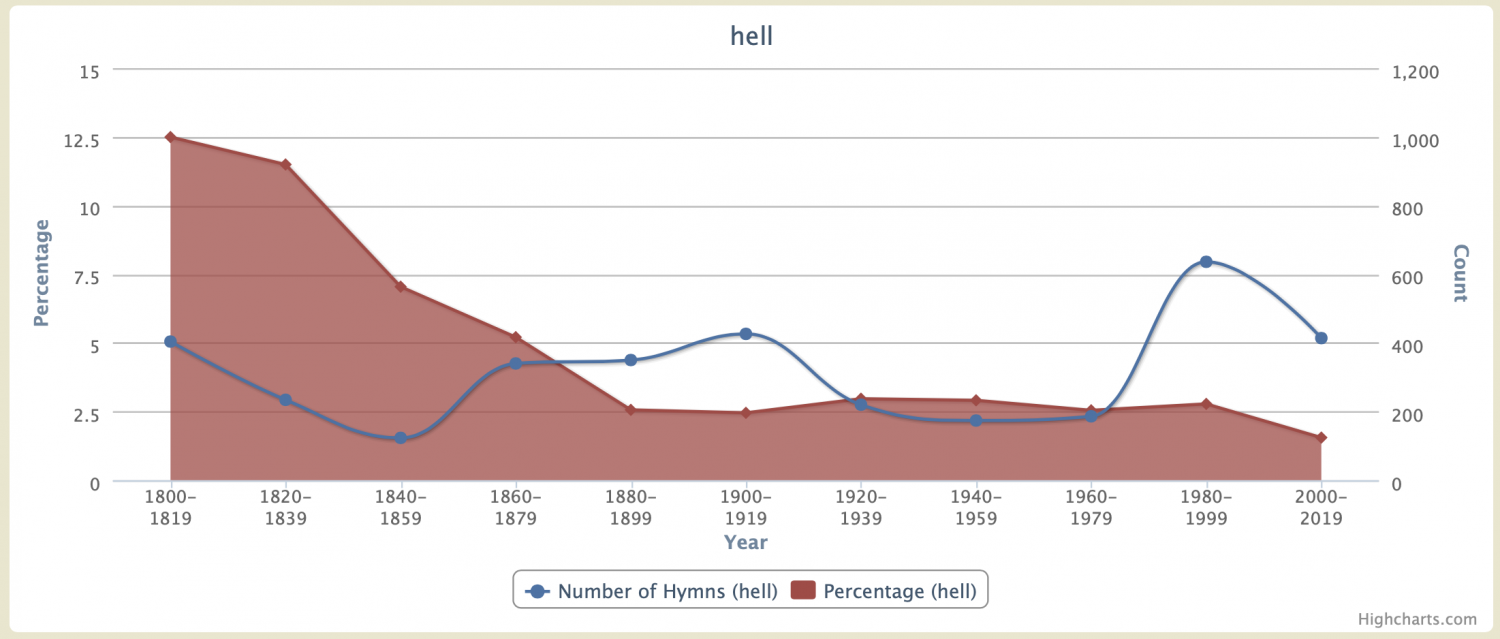Read 2 Thessalonians 1:5-10.
For it is indeed just of God to repay with affliction those who afflict you, and to give relief to the afflicted as well as to us, when the Lord Jesus is revealed from heaven with his mighty angels in flaming fire, inflicting vengeance on those who do not know God and on those who do not obey the gospel of our Lord Jesus. These will suffer the punishment of eternal destruction, separated from the presence of the Lord and from the glory of his might, when he comes to be glorified by his saints and to be marveled at on that day among all who have believed. (2 Thessalonians 1:6-10)
Hell is not a very popular place these days.

According to Hymnary.org’s keyword graphing tool of word occurrences in hymns, in the 1800-1819 timeframe “hell” was mentioned in 12.5% of published hymns. In the 2000-2019 time it was down to 2.5%. (Heaven is losing popularity as well—30% of hymns published in the 1860-1879 timeframe mentioned “heaven”, while in the last 20 years the ratio is down to 13%.)
Even the common lectionary carefully avoids passages that mention punishment or destruction or vengeance. You won’t find the reading above in any lectionary passage. Some of 2 Thessalonians 1 is read on Proper 26, Year C, but verses 5-10 are omitted.
Most Christians take the Apostles’ Creed as a good statement of the fundamental beliefs of Christianity. Except for that one statement, “He descended into hell.” They say “what that means is, ‘he was truly dead’”. But isn’t “He died and was buried” sufficient for that?
What is hell? Where is hell? According to Boehme, hell is all around us, as is the kingdom of heaven. We don’t see them clearly, but when the veil is lifted, when the new heaven and earth of transparent crystal are revealed, when what we have made of ourselves is clearly seen, when the judgment takes place, love of God — or alienation from God — will be obvious. For now, we can paper over our poverty with entertainment and diversions. Let me get myself a drink. But what will become of me when there is no more drinking, or Internet, or sleeping, or darkness, or hiddenness? Is that a day I long for, or shrink from?
According to Boehme, hell is all around us, but it is veiled. Hell is the rule of the “I”, the ego. Hell is alienation and separation from God. When we fail to turn to Jesus, we choose to stay in hell. We are “separated from the presence of the Lord and the glory of his might.”
“My God, my God, why have you forsaken me?”—Jesus descended into hell.
When hell is understood in this way, many of its perceived problems disappear. “How can God condemn people he supposedly loves to eternal torment?” They choose to remain alienated from God, to be their own kings. They flee from God. They refuse to enter the kingdom of Heaven. “Where is this supposed place—beyond the stars?” No, it’s all around you, even though it’s veiled. It is a place where spirits abide, not a physical place. You are in it. The hell you are in is your alienation from God. Our souls cannot rest until they rest in him.
Is it time for a resurrection of hell?


